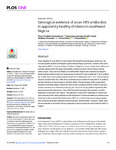2021-02-26Zeitschriftenartikel
Serological evidence of avian HEV antibodies in apparently healthy chickens in southwest Nigeria
Osamudiamen, Fisayo Temilade
Akanbi, Olusola Aanuoluwapo
Oluwayelu, Daniel Oladimeji
Bock, C. -Thomas
Klink, Patrycja
Avian hepatitis E virus (aHEV) is associated with hepatitis-splenomegaly syndrome, big
liver and spleen disease and hepatic rupture haemorrhage syndrome. However, the knowledge about aHEV in commercial layer chickens in Nigeria is scarce. In this study, 460 serum
samples obtained from 36 apparently healthy commercial layer chicken flocks in three
states (Ogun, Osun and Oyo States) of southwestern Nigeria were analysed by enzyme
linked immunosorbent assay for the presence of anti-aHEV immunoglobulin Y (IgY) antibodies. In total, the overall seroprevalence of anti-aHEV antibodies was 14.6%. The serological
analysis revealed that 75% of the flocks examined were positive for anti-aHEV IgY antibodies from chickens of various ages in all three states. The percentage of the seropositive
chickens in the three states varied from flock to flock ranging from 60% to 88.8% and seropositive chickens were detected at any age (24–52 weeks of age) without significant differences between the age groups. This is the first report assessing the presence of aHEV
antibodies in chickens from Nigeria. The detection of anti-aHEV antibodies in commercial
layer chickens in this study emphasizes the importance of serosurveillance in disease monitoring due to the economic threat posed by aHEV as a result of decreased egg production
and increased mortality in affected commercial layer chicken farms. However, further studies are essential to reveal the clinical implications and to assess the real burden of aHEV in
Nigeria.
Files in this item

